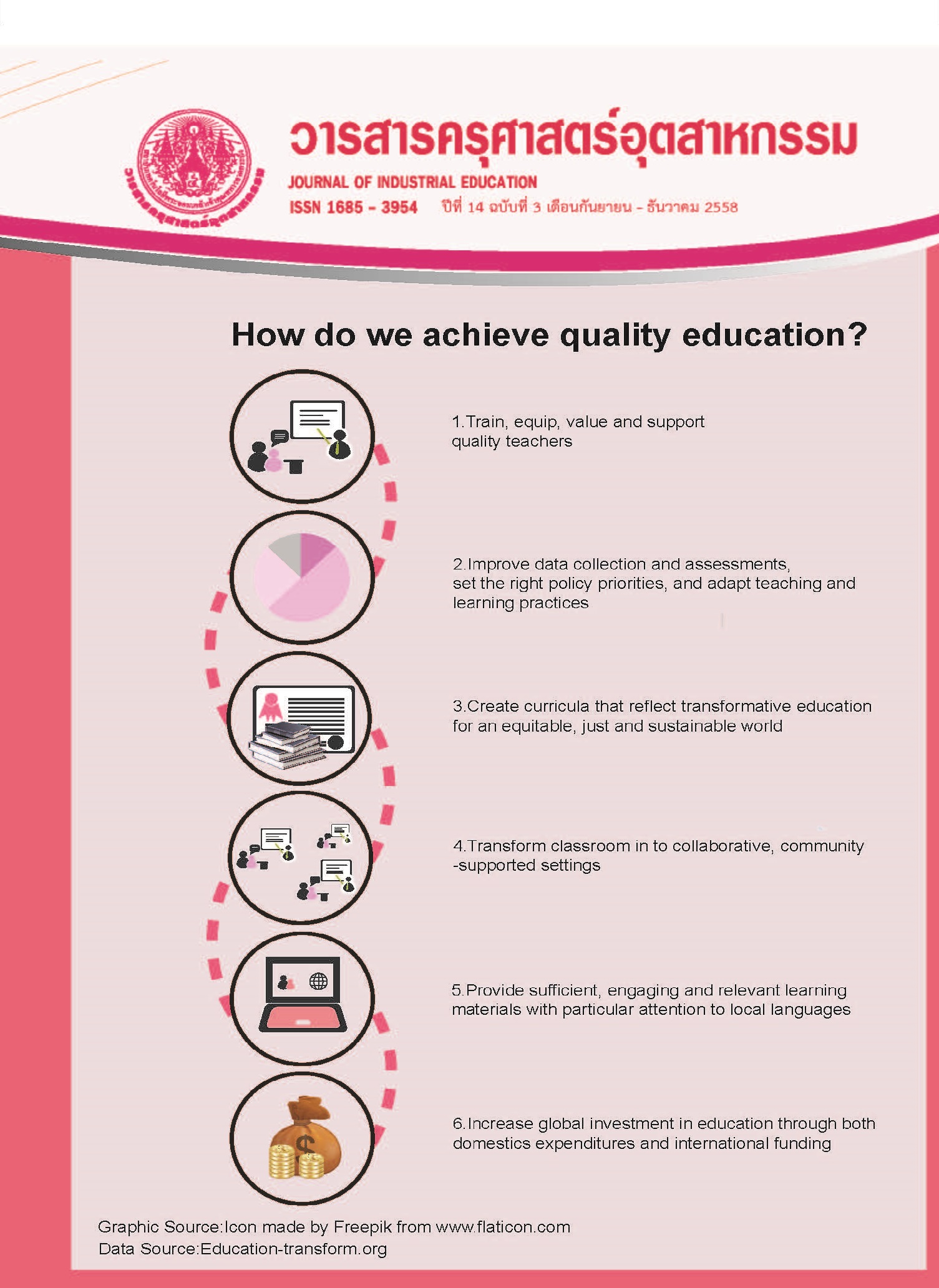A Development of Instructional Model to Develop System Thinking For Undergraduate Students Major in Physical Education
Main Article Content
Abstract
The purposes of this study were to develop a system thinking model for undergraduate students major in Physical Education. The study was divided into two phases; 1) a development of system thinking model based on the analysis of related documents and under the approval of experts, and 2) to investigate the effectiveness of the model via a group pretest-posttest study design. The sample for this study was multi-stage sampling from the third year students of the Faculty of Physical Education, Sukhothai campus. Thirty five students were purposively selected. The instrument for collecting data was a Systems Thinking test. data were manipulated and analyzed by using percentage, mean, Standard Deviation, and t-test.
Results showed that 1. regarding to the factors of the model, there were six factors as 1) Related theories, 2) Principles, 3) Purposes, 4) Contents, 5) Instruction activities (including seven steps; problem-generated stimulation, data seeking, thinking development, thinking changes and adjustment, presentation planning, discussion, and evaluation of the thinking processes), and 6) Evaluation. The experts verified that the suitability of the model was at the high level and applicable; 2. regarding to the effectiveness, after learning with the model, students’ systems thinking was statistical significance (p<.01).
Article Details
"The opinions and contents including the words in papers are responsibility by the authors."
"ข้อคิดเห็น เนื้อหา รวมทั้งการใช้ภาษาในบทความถือเป็นความรับผิดชอบของผู้เขียน"
References
[2] Sweeney, Linda, Booth. 1999. Guidelines for daily Systems Thinking Practice. Waltham: Pegasus Communication.
[3] นพคุณ นิศามณี. 2548. การคิดเชิงระบบ (Systems Thinking).วารสารพัฒนาเทคนิคศึกษา, 55(17), น. 36-42.
[4] ศศิณัฎฐ์ สรรคบุรานุรักษ์ และอติยศ สรรคบุรานุรักษ์. 2558. การบริหารจัดการหลักสูตรในศตวรรษที่ 21: ห้องเรียนกว้างเท่ากับ โลก. วารสารวิชาการและวิจัยสังคมศาสตร์, 10(28), น. 1-14.
Sankaburanurak, S. and Sankaburanurak, A. 2015. Curriculum Management in 21st century: A Classroom as the World. Socail Sciences Research and Academic Journal, 10(28), p. 1-14.
[5] Keeves,J.P. 1997. Models and Models building. In keeves, J.P. (ed) Educational research, methodology and measurement : An International Handbook. 2nd ed, Oxford : Peraman Press.
[6] Joyce, B. and Weil, M. 2000. Models of Teaching. 6th ed. Boston: Alyn and Bacon.
[7] ทิศนา แขมมณี. 2556. รูปแบบการเรียนการสอน:ทางเลือกที่หลากหลาย. ครั้งที่ 8. กรุงเทพฯ: แอคทีฟ พริ้นท์.
[8] Klausmeier,H.J. 1985. Educational Phychology. 5th ed. NewYork: Harper & Row.
[9] Piaget, J. 1972. Intellectual evolution for Adulthood. Human Development, 19, p. 1-12.
[10] Vygotsky, L.S. 1978. Mind in society: The developmental of higher psychological process. In M. Cole, V. John- steiner, S. Scribner & E. Suberman (Eds.), The developmental of higher psychological processes. p. 84-91. London: Harvard University Press.
[11] Senge, P. 1993. The fifth discipline :The art & practice of the learning organization. London : Century Business.
[12] Verhoeff, R.P. 2003. Towards systems thinking in cell biology education. Master’s thesis. University of Utrecht.
[13] มนตรี แย้มกสิกร. 2546. การพัฒนารูปแบบการเรียนการสอนเพื่อพัฒนาการคิดเชิงระบบของนิสิตระดับปริญญาตรี สาขา เทคโนโลยีทางการศึกษา. ปริญญานิพนธ์ การศึกษาดุษฎีบัณฑิต มหาวิทยาลัยศรีนครินทรวิโรฒ
Yamkasikorn, M. 2003. A Development of Instructional Model to Create Systems Thinking of the Undergraduate Student Majoring in Educational Technology. Dissertation, Ed.D.(Curriculum Research and Development) Graduate School, Srinakharinwirot University.
[14] บุญเลี้ยง ทุมทอง. 2553. การพัฒนารูปแบบการจัดการเรียนรู้เพื่อพัฒนากระบวนการคิดเชิงระบบวิชาคณิตศาสตร์ ระดับช่วงชั้นที่ 4. วิทยานิพนธ์ศึกษาศาสตรดุษฎีบัณฑิต สาขาวิชาหลักสูตรและการสอน. มหาวิทยาลัยขอนแก่น.
Thumthong, B. 2010. The Development of Instructional Model Encouraging the Systems Thinking Process for Mathematics, Level 4. Doctor of Education Thesis in Curiculum and Instruction, Graduate School, Khon Kaen University.
[15] Assaraf, O.B. 2010. System Thinking Skills at the Elementary School Level. JOURNAL OF RESEARCH IN SCIENCE TEACHING, 47(5), p. 540-563.
[16] พิสณุ ฟองศรี. 2552. วิจัยทางการศึกษา.พิมพ์ครั้งที่ 6. กรุงเทพฯ : ด่านสุธาการพิมพ์.
[17] กรมวิชาการ. 2545. แนวทางการวัดและประเมินผลการเรียนตามหลักสูตรการศึกษาขั้นพื้นฐานพุทธศักราช 2544. กรุงเทพฯ : กระทรวงศึกษาธิการ.
[18] วารีรัตน์ แก้วอุไร. 2557. การพัฒนารูปแบบการจัดการเรียนรู้เพื่อพัฒนาคุณภาพผู้เรียนสู่สังคมแห่งคุณธรรม ภูมิปัญญา และการเรียนรู้. วารสารวิจัยการศึกษา. 2(3), น. 46-58.
Kaewurai, W. 2014. A development of learning management model for developing Quality of learner leading to moral, wisdom, and learning society. Journal of Education Research, 2(3), p. 46-58.
[19] สายัณห์ วงศ์สุรินทร์. 2557. การพัฒนารูปแบบการจัดการเรียนรู้ตามแนวคิดจิตตปัญญาศึกษาเพื่อพัฒนาความมีวินัยของนักเรียนมัธยมศึกษา. วารสารครุศาสตร์อุตสาหกรรม, 13(3), น. 74-82.
Wongsurin, S. 2014. The Development of Instructional Model According to the Concept of Contemplative Education to develop the Discipline of Secondary Students. Journal of industrial education, 13(3), p. 74-82.
[20] สุขวิทย์ โสภาพล. 2554. แนวทางการจัดการเรียนรู้แบบเรียนรู้ และค้นพบความรู้ด้วยตนเอง ในสหวิทยาการวิทยาศาสตร์ชีวภาพเพื่อเศรษฐกิจพอเพียง. วารสารครุศาสตร์อุตสาหกรรม. 10(2), น. 172-180.
Sopaphon, S. 2011. The Guideline of Self- Study Management in the Subject of Interdisciplinary Approaches to Life Sciencency Economy. Journal of industrial education, 10(2), p. 172-180.
[21] บุญเลี้ยง ทุมทอง. 2552. การสังเคราะห์รูปแบบการจัดการเรียนรู้ที่ส่งเสริมกระบวนการคิดเชิงระบบวิชาคณิตศาสตร์ ระดับช่วงชั้นที่ 4. วารสารวิจัย มข., 9(4), น. 75-82.
Thumthong, B. 2009. A Synthesis of an Instructional Model Encouraging Learner’s Systematic Thinking Process in a Mathematics, Level 4. KKU RESEARCH JOURNAL, 9(4), p. 75-82.
[22] สุนิภา ชินวุฒิ. 2555. ประสิทธิผลของการเรียนแบบร่วมมือเพื่อเสริมสร้างกระบวนการคิดเชิงระบบของนักศึกษาพยาบาล. งาน วิจัยวิทยาลัยพยาบาลบรมราชชนนี ชลบุรี.
Chinawut, S. 2012. The Effectiveness of Co-operative Learning Method for Promoting Systems Thinking Process of Nursing Students. Research, Boromarajonani College of Nursing Chon Buri.

